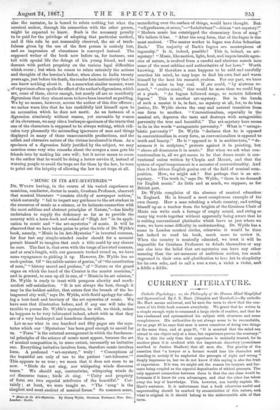CURRENT LITE RAT URE.
Catholic Psychology ; or, the Philosophy of the Human Mind Simplifia and Systematized. By J. X. Hart. (Simpkin and Marshall.)—By catholic- Mr. Hart means universal, and he uses the term to show that tho con- tents of his little book concern everybody. We grant that he writes in a simple enough style to command a large circle of readers, and that ho- has condensed and systematized his subject with clearness and some completeness. His authorities do not always seem to be reconcilable, for on page 40 he says that man is never conscious of doing two things- at the same time, and at page 91, "It is asserted that the mind can attend to one object only at a time, but experience proves the contrary." Nor is this the only time that experience is unkindly treated, for in another place it is credited with the important discovery (sometimes ascribed to Justice Shallow) that all men die. The gravity of the- assertion that "a lawyer or a farmer would lose his character and standing in society if he neglected the precepts of right and wrong deeply impresses us, but we do not know if this saying is also the fruit of experience. If it was, we might ask the reason for lawyers and far- mere being coupled as the especial depositaries of ethical precepts. Thc only apparent connection between them is that the one class would be fortunate if it knew its own advantages, and that the other has taken- away the key of knowledge. This, however, can hardly explain Mr.. Hart's sentence. It is unfortunate that a book otherwise useful and unpretending should be marked by eccentricities of this nature, an what is original in it should belong to the unfavourable side of that term.






























 Previous page
Previous page